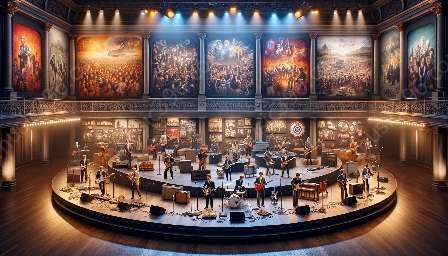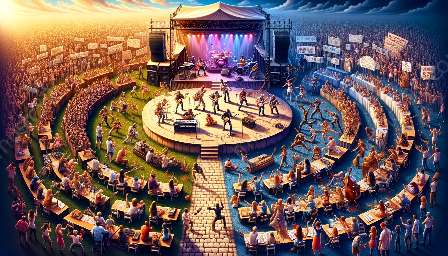The evolution of rock music has been inexorably intertwined with the rise of radio and television, as these mediums have played a significant role in the promotion and popularization of the genre. Rock music, with its rebellious spirit and raw energy, found a natural ally in the emergent platforms of radio and television, which served as powerful tools in reaching mass audiences and shaping cultural movements. This article will delve into the profound influence of radio and television in the promotion of rock music, tracing their impact on its history and exploring the dynamic interplay between media and music.
The Birth of Rock and the Rise of Radio
The roots of rock music can be traced back to the 1950s, when it emerged as a visceral and revolutionary sound that embodied the spirit of rebellion and defiance. One of the key factors that propelled the rise of rock music was the advent of radio. With the introduction of FM radio and the proliferation of dedicated rock music stations, a new avenue for reaching audiences was born. Radio played a pivotal role in promoting rock music, providing a platform for both established and emerging artists to showcase their music to a wide audience.
As the popularity of rock music soared, radio DJs became influential tastemakers, shaping the musical tastes of their listeners and propelling emerging rock bands to stardom. The evolution of radio programming, from Top 40 countdowns to dedicated rock shows, further propelled the genre into the mainstream, effectively promoting and popularizing rock music.
The Television Revolution and Rock Music
Television emerged as a game-changer in the promotion of rock music, with music shows and live performances becoming a staple of television programming. The advent of iconic music programs such as 'American Bandstand' and 'Top of the Pops' provided a visual platform for rock artists to showcase their music and connect with their audience. These shows not only promoted rock music but also played a significant role in shaping the visual identity and cultural impact of the genre.
Television also played a critical role in bringing rock concerts and music festivals into the living rooms of millions of viewers. Landmark events such as Woodstock and Live Aid were broadcast to global audiences, effectively leveraging the reach and influence of television to promote rock music on an unprecedented scale.
The Fusion of Media and Music
Radio and television not only promoted rock music but also became integral to the storytelling and mythmaking of rock legends. The visual medium of television brought the charisma and electrifying performances of rock icons directly into the homes of fans, elevating the connection between artists and their audience. The symbiotic relationship between radio, television, and rock music gave rise to an interconnected ecosystem of promotion, where the sound, image, and ethos of rock music were disseminated and immortalized through the media.
Moreover, as technology advanced, the advent of music videos revolutionized how rock music was promoted and consumed. Television channels dedicated to music videos provided a platform for artists to visually express their music, further solidifying the bond between rock music and the medium of television.
Impact on the Evolution of Rock Music
The role of radio and television in promoting rock music has been pivotal in shaping the evolution of the genre. These mediums have not only brought rock music to a global audience but have also facilitated the cross-pollination of rock subgenres and the cultivation of diverse rock communities. The promotional power of radio and television has influenced the sonic landscape of rock music, amplifying the reach and impact of different styles and movements within the genre.
Furthermore, the symbiotic relationship between radio, television, and rock music has contributed to the cultural and social impact of the genre. The images and narratives of rock music, disseminated through the visual medium of television and the airwaves of radio, have played a profound role in shaping popular culture and societal attitudes.
Conclusion
Radio and television have been instrumental in promoting rock music and shaping its history. From the pioneering days of rock 'n' roll to the diverse landscape of contemporary rock, the fusion of media and music has propelled the genre to unprecedented heights of popularity and influence. The role of radio and television in promoting rock music has not only been a testament to the power of media in shaping cultural movements but has also underscored the enduring legacy of rock music as a driving force in the evolution of popular music. As we continue to witness the ever-evolving dynamics between media and music, it is clear that the profound impact of radio and television on rock music will continue to reverberate through the annals of musical history.


















































